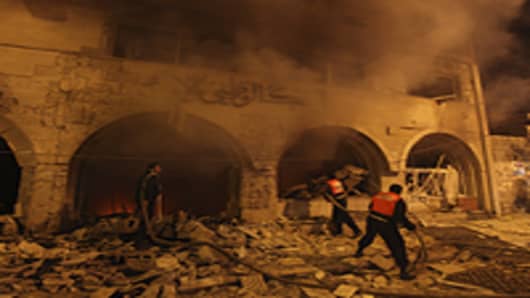Hamas, the Palestinian militant group that controls Gaza, has a new problem: its finances.
Since Hamas was founded in 1987, Iran has been its biggest financial benefactor. The aid increased when Hamas took over the Gaza Strip in 2005 by expelling the Palestinian Authority.
But in the last year, the flow of money from Shiite-dominated Iran has tapered off due to a disagreement over Syria. During the almost two-year long civil war in Syria, Hamas has supported the rebels, most of whom are Sunnis like themselves. Iran supports President Bashar al-Assad, a member of the Alawite sect, an offshoot of Shiite Islam.
"Iran was providing Hamas tens or even hundreds of millions of dollars in past years, but Iran has either sharply reduced or stopped payments recently," said Alireza Nader, an Iran expert at Rand Corp.
Even if Iran's money supply to Hamas has slowed, it's still the main supplier of Hamas' weapons, which intelligence sources are provided as gifts. Hamas' stockpile of Fajr 5 missiles has been one of the main targets of Israeli airstrikes over the last week because of their longer range and capacity to do a lot of damage. A Fajr 5, which carries a 385-pound warhead, destroyed a building in a Tel Aviv suburb on Tuesday.
(Read More: Egypt Announces Cease-Fire Deal for Gaza.)
Hamas has many other sources of funding. Intelligence officials say Hamas controls Gaza's black market and makes millions of dollars from cigarettes smuggled from Egypt.
It also controls hundreds of smuggling tunnels leading from Egypt's loosely patrolled Sinai desert. Goods ranging from small household items to cars and trucks are sent through the tunnels and are then subject to a Hamas tax. Sometimes Hamas takes two cracks at the goods renting out the tunnels to smugglers and then taxing the goods they bring in.
For years Hamas has also raised money through Islamic charities. It gained donor respect over the years by carrying out high-profile kidnappings and scores of suicide bombings in Israel, killing more than 1,000 civilians.
One diplomatic source recently briefed by intelligence officials said fundraising efforts often involve private individuals in Saudi Arabia. The government of Qatar has also been a major donor. The emir of Qatar, Sheik Hamad bin Khalifa al-Thani, visited Gaza earlier this month.
Several Hamas fundraisers have been identified and branded terrorist entities by the U.S. Department of Treasury, including the Holy Land Foundation, Interpal, the Palestinian Association in Austria and the al-Salah Society to name a few. Matthew Levitt, a former U.S. Treasury official, said some of the money raised by charity is paid to Hamas operatives as salary.
Much of that cash winds its way through the National Islamic Bank in Gaza. However the Israeli Air Force cut off those funds Tuesday when it targeted the bank, reducing it to rubble.
Hamas also collects taxes from people living in the Gaza Strip and businesses operating there. It collects a "zakat," an Islamic tithe equaling 2.5 percent of an individual's earnings that must go to charity.
"Hamas has matured in the way that it raises money," Levitt said.
—By CNBC's Jason Gewirtz



